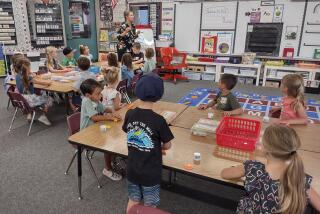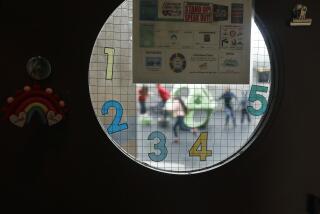Ready or Not: The Kindergarten Dilemma
- Share via
Who knew kindergarten could be so complicated? As school gets underway this week, many parents of children with summer and fall birthdays are wringing their hands over whether the decision they made to hold Johnny back or push Suzy on was right. The angst is justified.
Kindergarten readiness is a hot-button issue that brings into play economics, politics, parental pride, test scores, academic climate and much more. To sort it all out, parents need a clear head, some professional input and a reliable crystal ball.
Driving the decision usually--though not ideally--is a child’s birth date. “Age is the fairest way to determine access, but not the best,” said Diana Guerin, chairwoman of child and adolescent studies at Cal State Fullerton. “Children vary greatly in their rate of development.”
In California, public school kindergartens must accept any child who turns 5 on or before Dec. 2. Parents can opt to wait a year but legally must put their children in school when they are 6. Most private schools have an earlier cutoff, requiring that children be 5 by Sept. 1, like most other states. California is one of only seven states with the later cutoff. (Hence our low test scores, some charge.)
However, in many private schools, children must also meet readiness standards or spend a year in pre-kindergarten class before being accepted into kindergarten. In public schools, as well, many parents opt to delay their child’s entry to give the youngster an extra year to mature and, possibly, an extra edge academically. But how much does that year matter, and could waiting be harmful to future academic success?
*
That’s the question keeping parents of children with borderline birthdays up at night. As one mother put it: “The choice is not between a good choice and a bad one, but a bad one and a less bad one.” Parents feel stuck between twin devils of destiny--a child who’s old for the class and may possibly get bored or one who is young and may be in beyond his academic or social capacity.
Opinions of child development experts and educators often differ. Proponents of delayed entry argue that kids not developmentally ready will struggle in today’s more academic kindergartens. Others say children who fall close to the cutoff but show clear signs of readiness could miss important learning opportunities if held back.
Barbara Chancey, an education specialist whose company, Chancey & Bruce Educational Resources, of Huntington Beach, has been performing kindergarten readiness testing for 20 years, advocates delaying entry for kids with fall birthdays. “What I see when I look at the fall birthday kids [who enter early] is that they hang in but never quite meet their fullest potential,” she said.
Given the choice between a child struggling academically or bored with the pace, she’d take bored. “It’s easier to present enrichment to stimulate a child than to alleviate the stress of a student not ready for what’s being presented,” said Chancey, a former kindergarten teacher. On the other hand, said Susan Stiffelman, a Malibu-based learning specialist, when you delay entry, “you get the disgruntled senior at age 19 thinking: ‘I could have been done with this a year ago.’ ”
Sharon Hawley, an education consultant for the California Department of Education, disagrees with the growing trend of delayed entry and believes children should go with the program based on their birthdays. “If the child meets the cutoff, I’d enroll him. In the long run it’s best to keep children with their age mates. Teachers should accommodate the students--not the other way around.” Most of the development fluctuations seen in the early years evens out by grades three and four, she said.
Cal State Fullerton’s Guerin has been involved in a long-term study that has looked at--among other issues--delayed kindergarten entry by following a group of fall-birthday children for 20 years. The Fullerton Longitudinal Study began in 1979 and included 130 infants, all born between late August and early December; 107 participants have remained in the study. Researchers wanted to look at how a variety of environmental factors and decisions, including delayed starts to kindergarten, affected children over time.
*
The researchers found that it didn’t matter much whether kids started kindergarten at 5 or 6. “When we looked at achievement levels, delaying entry was not an advantage or a disadvantage,” she said. She expects to publish the kindergarten entrance aspects of the study later this year. Parents tend to have good instincts, she said. “Parents of quick learners almost always chose to put their kids in as early as possible. Of the kids labeled gifted, with IQs of 130 or above, 18 out of 20 started kindergarten at age 5.”
The key question then--besides age--is what factors should parents consider? Here are some:
* Match the program to the child. Kids have different learning styles, said Stiffelman. A child who’s a hands-on learner is not going to do well in a structured, all-day, sit-at-your desk kindergarten. Some kindergartens are very academic, others allow more freedom to move around and play. And remember, kindergarten was once the first transitional step from home to school, but preschool now takes that role. “Kindergarten is now more like first grade,” she said.
* Consider gender. In general, boys are developmentally behind girls by three to six months. As a result, parents and teachers are more apt to delay their entry. “Girls are more suited for the classroom because they have better fine motor skills,” said Chancey. “They tend to be more oriented to paper and pencil. Boys are better with their large motor skills. But there are exceptions.”
* Factor in the pre-kindergarten experience. The 5-year-old who has been to preschool is very different from the one who hasn’t. “When comparing academic ability, there may not be much difference between a child who has been in a stimulating home and the one in preschool,” said Chancey. “But you’ll see differences in their socialization, which is equally important.”
* Look at the emotional picture. If there’s been a big change in the family, such as a divorce, a death, a big move or recent illness, kindergarten may be too much for a borderline child, said Stiffelman.
* Don’t get hung up on physical size. Though some parents feel inclined to hold back a small boy and push on a tall girl, don’t. If it’s sports ability a parent is concerned about, that bothers Hawley. “If dads want to hold sons back from a full year of cognitive development so they’ll be better in sports, they have something a little out of whack.”
* Assess your child. Social and emotional readiness, physical development and cognitive skills are equally important. Consult the preschool or Head Start teacher or another professional to evaluate your child’s readiness.
* Relax. While you want to get this decision right, if you do put a kid in too early, kindergarten is the best grade to repeat. Beyond that, repetition gets less successful because there are more social issues, experts agreed.
More to Read
Sign up for Essential California
The most important California stories and recommendations in your inbox every morning.
You may occasionally receive promotional content from the Los Angeles Times.













